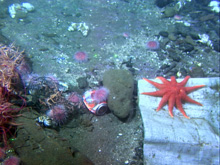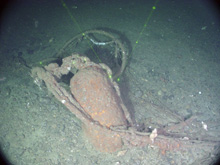A dump site of partially burned waste with soda cans, a cloth bag and netting still in evidence. Dumping is not allowed in the sanctuary so this site came as quite a surprise. Click image for larger view and image credit.
First Sighting, A Soda Pop Can
June 2, 2006
Mary Sue Brancato
The excitement mounted as we descended for our deepest dive and only canyon dive on this cruise. Our target area was about 650 meters deep, at the head of the Juan de Fuca Canyon. We landed on a silty mud bottom—not a great surprise since canyon dives on previous cruises had included similar substrate and it is documented in the literature that canyons can be sinks for sediments from some of our major rivers. We began to move forward, and the first organism came into the view. It was a rockfish, but what was it lying next to? A soda pop can! Here we are exploring the unknown—as we are sure you have heard before, less is known about the deep sea than what we know about the moon—and yet one of the first things we see in this unknown frontier is debris from humans! Depressing. A fellow scientist on board, Peter Etnoyer, hearing the despondent voices, quickly countered the reaction by expressing what wonderful sites await us as well…and fortunately they do, and we come out of our funk.
Unfortunately, the soda can in the canyon is not the only debris we see on this cruise. In addition to bottles and cans, we also found a considerable amount of lost fishing gear, sometimes wrapped around boulders and corals and tautly stretched for more than 80 meters. At one location on this same dive, we saw a large pile of debris partly incinerated except for netting, a large plastic weave bag and several dozen soda pop cans. Pink urchins, whelks and sea stars were scattered in with the debris—a disgusting sight. Discharges are prohibited in the sanctuary so this dump heap was not expected. Out of sight, out of mind? People need to know the impacts of their waste and just where that waste ends up.
Information on ocean dumping regulations:
http://www.epa.gov/owow/oceans/debris/ ![]()
Ocean Dumping Ban Act of 1988 (www.epa.gov/history/topics/mprsa/02.htm ![]() )
)
Sign up for the Ocean Explorer E-mail Update List.















